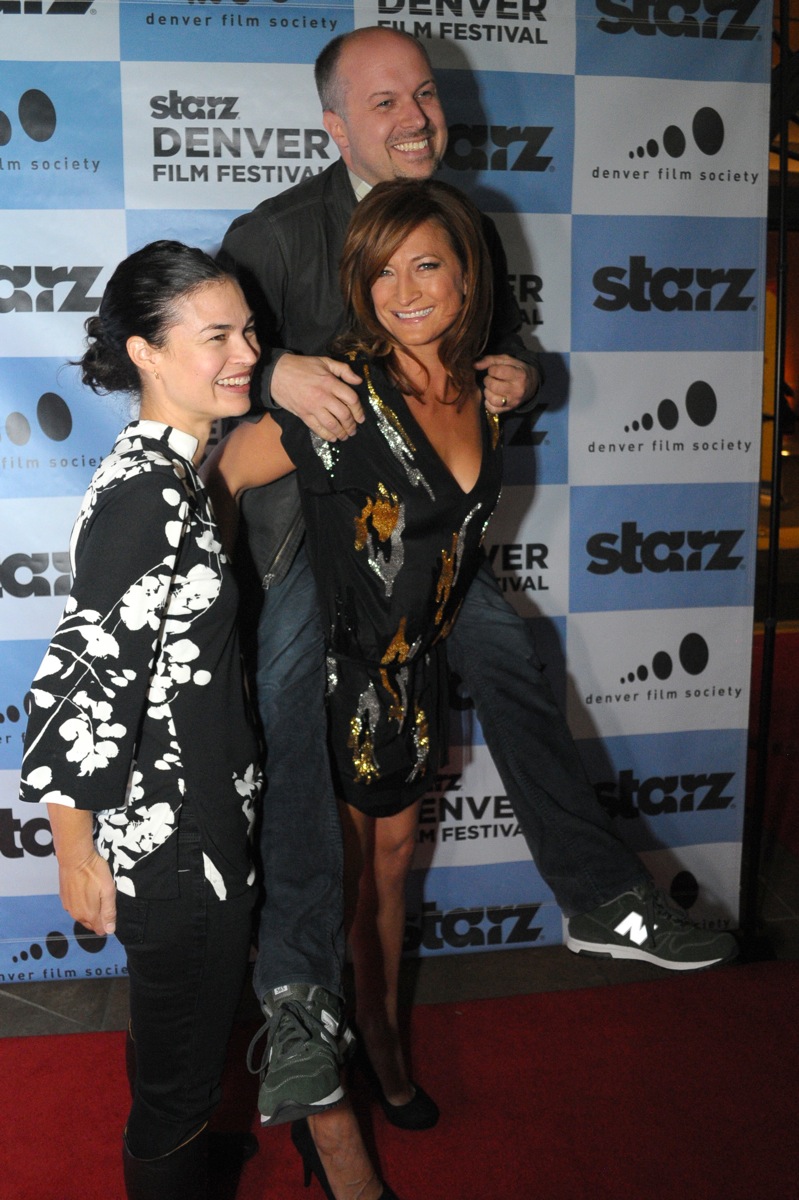The Local newsletter is your free, daily guide to life in Colorado. For locals, by locals.
On Saturday, Starz Denver Film Festival patrons were treated to a rare behind-the-scenes glimpse of the movie industry. A panel discussion called The Talent You Don’t See introduced us to a quartet of people you may not hear much about, but who deserve a lot of credit for big-screen successes. It was a heavy-hitting group; you’ll be familiar with their work, if not their names. Read on for an inside look at Hollywood.
Zoe Bell, stuntwomen/stunt coordinator

Where You’ve Seen Her: The New Zealand native (pictured here giving film fest juror Adam Roffman a lift) doubled for Lucy Lawless on Xena: Warrior Princess and for Uma Thurman in Kill Bill: Vol. 1 and Kill Bill: Vol. 2.
What She Said: “The more the danger level goes up, the more the precautions should go up.” • “I was never a film buff. I did gymnastics as a little kid, then martial arts.” • “We’d finish a 20-beat fight in three hours on Xena. In Kill Bill, we had three weeks to film the trailer fight.” • On being Sharon Stone’s stunt double in Catwoman: “It was a mimic of a freefall, 23 stories up. You’ve got all the safeties in place. I was the farthest from death I’ve been, but if something had gone wrong…”
Heidi Levitt, casting director
Where You’ve Seen Her Work: Levitt has worked as casting director for movies such as The Artist, JFK, and Benny & Joon.
What She Said: “I come in at the beginning of the process, after the writing. I basically interpret the vision of the director.” • “I’ll read the script for the dialogue and try to hear the voices first.” • One movie where the casting went wrong: “What Dreams May Come. I was trying to get the studio to cast Michelle Pfeiffer or Annette Bening [to play Robin Williams’ wife]. They wouldn’t pay for it. I love Annabella Sciorra, who we cast, but I don’t think she was the person for the role. I wanted Jude Law for Robin Williams’ son. But Cuba Gooding Jr. had just won an Oscar. The cast was like the United Colors of Benetton.” • “Our job is so much at the beginning. By the time the director makes the movie, you’re really not there. We’re not the decision makers; we’re the gatekeepers.” • “We’re living in a completely different era right now. To get people to go to the movie theater, you need to make it into an event, a must-do, or they’ll stay home—and it takes a lot of marketing.”
Betsy Heimann, costume designer
Where You’ve Seen Her Work: Heimann is responsible for Uma Thurman’s famous black-and-white outfit in Pulp Fiction.
What She Said: “I’ve been sewing since I was 12. I worked my way up from a seamstress.” • “I try to bring the character to life, to give the actor a shell so they can become the character before they go on screen.” • On Pulp Fiction: “We had a small budget. Uma is tall. We couldn’t afford pants to fit her, so I said ‘Let’s just cut [the pants].’ Hence the cropped pant.” • “I always have more than one idea.” • “Your best jobs are with the guys who just open your mind. Quentin [Tarantino] is contagious.” • “I like my work to feel timeless.” • “I come from the ‘do not notice me’ school of filmmaking. If you are taken away by a costume, you’re missing 30 seconds of a film.”
Nick Urata, musician/film composer
Where You’ve Heard Him: Urata has composed for Little Miss Sunshine, Grassroots, and Crazy, Stupid, Love. Plus, he’s the front man for Colorado’s own DeVotchKa.
What He Said: “The sign of a good score is if it’s not noticed except at the few moments when it’s needed.” • “I feel like I’m tinkering with people’s subconscious. That’s where the score is happening.” • “Who would have thought, ‘I’ve got Kevin Spacey dressed as a homeless man, riding a bike, and I have to make it shine musically?'” • “[The score offers] continuity of what’s happening, so you remember whatever you’re supposed to remember and feel what you’re supposed to feel.” • “You have to immerse yourself and watch the movie over and over again. You become part of it.”
—Image courtesy of Ann Vargas








